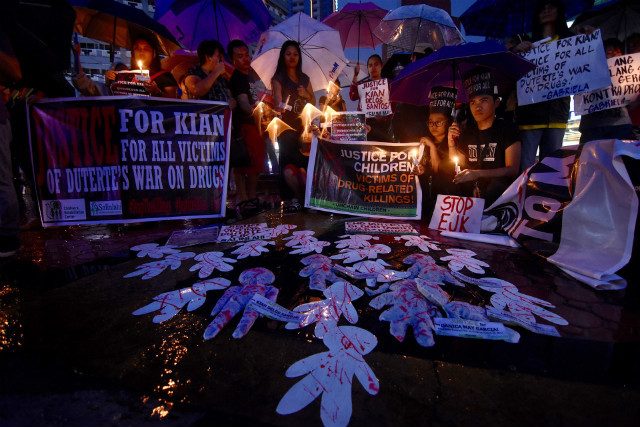SUMMARY
This is AI generated summarization, which may have errors. For context, always refer to the full article.

MANILA, Philippines – Human rights organizations lauded the decision of the International Criminal Court (ICC) to conduct a preliminary examination of the killings under President Rodrigo Duterte’s war on drugs.
Human Rights Watch (HRW) called the ICC’s action as a “rebuke” of the government’s efforts to deny the existence of extrajudicial killings in the country. (READ: Drug war in 2017: The year of deaths and denial)
“The ICC’s action is a rebuke of the Philippine government’s campaign of denial and distraction seemingly designed to deflect growing evidence of extrajudicial executions that Duterte and senior government officials have incited and instigated,” Param-Preet Singh, Associate Director of HRW’s International Justice Program, said in a statement on Friday, February 9.
The New York-based human rights organization also called for a United Nations-led international investigation.
ICC Prosecutor Fatou Bensouda on Thursday, February 8, said that her office has decided to pursue a preliminary examination of the drug war killings in the Philippines “following a careful, independent, and impartial review of communications and reports documenting alleged crimes.” (READ: Int’l Criminal Court closely following drug war killings since 2016)
The preliminary examination is the first step in a long process. The Office of the Prosecutor will conduct a preliminary examination to establish whether there are “genuine national proceedings” being conducted under the Philippine justice system. Due to complementarity, the ICC can only investigate if it sees that the Philippines does not or is “unwilling or unable to do so genuinely.”
Amnesty International said the first step was a “crucial moment for justice” and could signify that there would be an end to impunity.
“[The ICC move] offers a glimmer of hope to victims of the shocking atrocities committed in the government’s war on drugs,” said AI Southeast Asia and the Pacific Director James Gomez.
“This announcement is a warning to leaders around the world that those who order or incite crimes against humanity including murder will not be able to get away with it, and will be subject to investigation under international law,” Gomez added.
READ Rappler’s explainers:
Yes, Int’l Criminal Court can prosecute Duterte for killing spree
Police, military officials liable for Duterte’s illegal kill orders
What challenges will complaint vs Duterte face before ICC?
Philippine gov’t should cooperate
In Defense of Human Rights and Dignity Movement (iDEFEND), a coalition of more than a hundred civil society groups calling for the rule of law, considered the ICC preliminary examination as a “critical opportunity” for the Duterte administration to reconsider its violent approach to the drug issue.
Government data shows that at least 3,987 individuals have been killed in police anti-drug operations. The number of those killed vigilante-style is still highly contested – several groups estimated the figure could be more than 12,000. (READ: The Impunity Series)
iDEFEND also urged the Office of the Prosecutor to look into the criminal liability of Duterte as the highest power enforcing the drug policy that targeted the poorest Filipinos.
“He has strengthened impunity when he repeatedly promised to protect and pardon law enforcers found to have committed these crimes in the execution of their duties,” iDEFEND said in a statement.
“Duterte has likewise fueled hate and vilification of the critics of extrajudicial killings by accusing them of supporting drug criminals, and has threatened to kill human rights advocates in the same way as the criminals,” it added.
In a news briefing on Thursday, February 8, Presidential Spokesperson Harry Roque, said that if the complaint would prosper, Duterte would be willing to personally appear before the ICC. He clarified, however, that the Philippine leader would do this to put the prosecutor on the stand and grill him on why he decided to proceed with the case.
Prior to the filing of communications before the ICC on Duterte’s drug war in 2017, the Duterte administration had signaled its opposition to any probe. In October 2016, amid suggestions that he committed crimes against humanity through his drug war, Duterte threatened the Philippines’ withdrawal from the ICC.
In December 2017, Roque, speaking to state parties to the ICC, said the country will “reassess” its commitment to the international court if it violates the principle of complementarity.
iDEFEND, however, warned the government against withdrawal from the ICC, adding that it is for “our country’s best interest to remain a State Party, cooperate fully, and if willing and able, to practice complementarity.” – Rappler.com
Add a comment
How does this make you feel?
There are no comments yet. Add your comment to start the conversation.